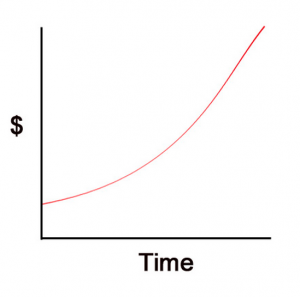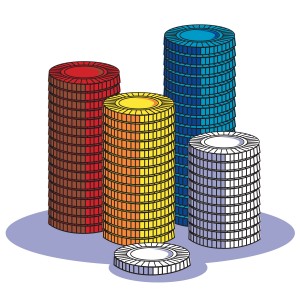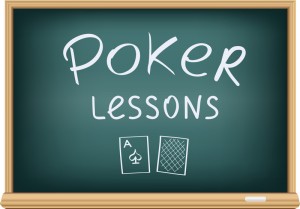It is not a comfortable thought, but every poker player might one day have to deal with the possibility of losing their entire bankroll. There are a number of ways that this might happen, but essentially it will boil down to one of the following:
1. You are not good enough to beat the game and so losing your bankroll is merely the result of the long term taking hold.
2. You have the ability to beat the game but play while on tilt, losing large amounts of money while not playing your best.
3. You can beat the game, but have poor bankroll management skills and so go broke during a downswing.
4. You have good bankroll management, but have a downswing so severe that you lose it all anyway.
Fortunately there is plenty you can do to avoid wiping out. You can hone your skills to ensure you have the maximum possible edge over your opponents. You can work hard to combat tilt and learn to walk away when you feel you might be on tilt. You can play with a large, conservative bankroll that will leave you little chance of busting out through variance.
However, if there is one certainty in poker it’s that nothing is certain. No matter how careful you are there always remains the slender possibility that you could lose it all. If you are a marginal winner with an ’adventurous’ bankroll strategy, then this could be a very real possibility indeed. On the other hand if you are a strong player with a very large bankroll then it might be just a tiny dot on the boundary of probability space. Nevertheless that possibility will be there and you need to know how to handle it should it occur.
Consider what you would do if your entire bankroll were wiped out. This is the blunt end of bankroll management and a real test of character. Do you have what it takes to pick yourself up and start again? The first step on the road to recovery is to answer the most important question of all.
What went wrong?
Be honest, what caused you to go broke? If you can’t find an answer to this question then what hope have you got of making sure it doesn’t happen again? Let’s go back to those four ways to go broke:
1. You can’t beat the game
2. Playing on tilt
3. Bad bankroll management
4. Bad luck
You need to work out which of these, or more likely which combination of these, caused your own demise. Bad luck is the odd one out in that it is likely to have played some part, but is very unlikely to be the sole reason, even if you might like to think it is rather than accept that you failed on one of the other three. It is possible to lose your entire bankroll through bad luck, in the same way that it is possible that you will win the lottery or that a NBA basketball team will go undefeated for an entire season. In other words it’s within the realms of possibility but so unlikely as to almost not be worth thinking about.
The challenge is being honest with yourself and recognising which of the other three you were guilty of and to what degree. It is not always obvious, because they can all manifest themselves in subtle ways. For example, it might be that you used to be a winning player, but the games have got tougher eliminating your edge. Maybe you had a decent bankroll, but didn’t move down limits in time when things started going bad. Or maybe you are frequently affected by a subtle form of tilt and are not aware of it. Whatever the problem, you need to find out before you can progress. Review hand histories, post hands on the forum, hire a coach, have discussions on the bankroll forum, whatever it takes.
Getting back on the horse
Once you are confident you have ascertained why you went bust, its time to get back out there and start rebuilding.
Or is it?
Are you sure you want to start playing again? It may well be that poker just isn’t for you, that you can’t solve the problem that caused you to bust out in the first place. Even if you have the ability to get back to where you were, there is no rule saying that you have to. If you have the desire and discipline to start all over again then that’s great, but if not then don’t feel bad about walking away. You can always come back to poker at a later stage if you want to.
If you do want to carry on playing poker, then you obviously have a lot to think about. First and foremost, how do you prevent what just happened happening again? Obviously this will depend on the conclusion you came to as to why you wiped out. If it was due to poor bankroll management, do you have a new bankroll rule in place and the discipline to stick to it? If it was due to tilt, what measures have you taken to reduce the likelihood of going on tilt in the future? If it is because you were not good enough to beat the game, have you improved your game significantly? Do you intend to play in easier games?
You also need to think about what level you want to go back in at. Most players’ first instinct is to deposit as much money as they can afford so they can play at a level close to where they were before they busted out. This isn’t always the best idea for a number of reasons. Firstly your confidence will probably be low, as you have just lost a ton of money playing at this level. Secondly you will be putting a lot of pressure on yourself to win quickly. If you start losing there will be a ‘here we go again’ feeling and it will be easy to go on tilt. Thirdly you might feel tempted to put more money in than you can comfortably afford, breaking the fundamental rule of gambling ‘only gamble with money you can afford to lose’. In fact, when playing poker, it is highly recommended that you only gamble with money that you can lose without it affecting you at all. Only then will you be sufficiently detached from the money you are playing with to make good decisions.
For these reasons it would be a far better idea to start at a lower level than you are used to and build up your confidence playing in easier games. Then, once you build your bankroll back to where you were previously, your confidence will be back and you will feel that you belong there. On the other hand you might not want to go in too low. If you are used to playing 10/20 for example, and you suddenly find yourself in a 25c/50c game, then the money involved might be too meagre to interest you and/or you might have no respect for the game. In either case will be much more prone to tilt and sloppy play than usual.
In Summary
Recovering from a complete bankroll wipe is one of the toughest things you will have to do as a poker player. If you do manage to do it then you can give yourself a pat on the back. Not only have you done extremely well to stay disciplined and focussed throughout the ordeal, but it has probably made you stronger as a player and a person, especially if it was a sizable sum that you lost.
Just make sure it doesn’t happen again.
Ian Taylor, AKA “Piemaster is the Co-Author of the highly regarded Poker Psychology Book “The Poker Mindset”.
Submit your review | |









